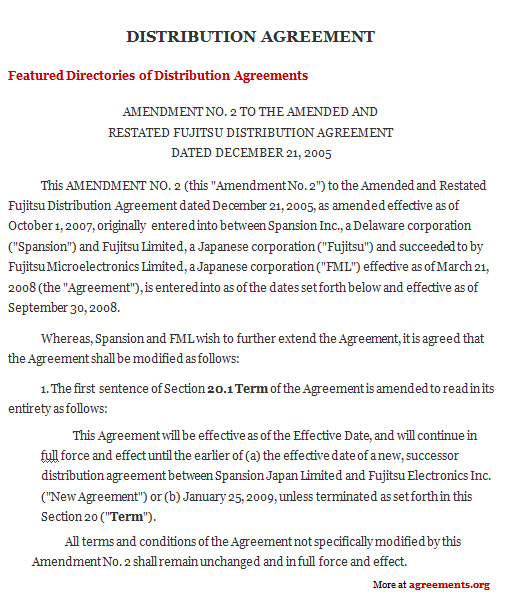A distribution agreement is a commercial contract that comes into existence between a service provider or a manufacturer and a distributor. It is a contractual document which lays down the requirements and mandates of marketing the product being manufactured or supplied.
For example, a pharmaceutical company enters into a distribution agreement with a pharmaceutical distributor who would distribute and market its medicines. A distribution contract, is especially, useful in companies which do not have a large sales force. Hiring an external distributor saves them the cost of hiring additional personnel. The risk too gets offset on the retailers.
Purpose of Distribution Agreement?
Companies usually hire distributors for getting their products marketed and to make them widely known. Typically, distributors are specialized and expert personnel who have a wide reach in the target markets. Having such distributors on an external payroll, helps, as it saves costs and mitigates risk. It also helps companies with a localized presence to sell their products in faraway markets.
Inclusions in a Distribution Agreement?
A distribution agreement contains the name of the parties, the commencement date, the duration or term of the agreement, registered office addresses of both the parties, their responsibilities, rights and obligations and standard boilerplate clauses such as dispute resolution, waiver, notices, remedies and severability.
Key Terms in a Distribution Agreement?
Following are the key terms of a distribution agreement:
- Scope of Distributorship: It must mandate the territory in which the distributor can market the products, product lines and brands that may be included in the ambit of the contract.
- Pricing & Terms of Payment: Typically, a commission based price consisting of a pre-agreed percentage of the sales amount is fixed. However, a fixed price model may also be followed.
- Rights and obligations of parties: The agreement should clearly set forth the rights and obligations of both parties to the agreement. It must mention the scope of advertising, and the goals to be attained on a graded timeline.
- Confidentiality: Confidentiality clause becomes very important as the distributor may come into access of confidential information of the service provider.
- Intellectual property: Brand reputation and trademarks of the service provider if used by the distributor need to be protected.
Drafting of a Distribution Agreement?
The following guidelines need to be followed while drafting a distribution contract:
- The territory where the products are sought to be distributed needs to be defined properly. Vague terminology such as `whole of the US’ or `Eastern Texas.’, should not be used. Specific phrases must be used.
- The duration of this contract should ideally be kept around 5-10 years. Scope for premature termination based on events of default must be provided.
- Intellectual property rights seeking to protect the trademarks of the service provider must be included.
- A formula for computation of commission also needs to be included.
- A method for assessing the performance of distributors needs to be devised.
- While drafting the confidentiality clause, label all information exchanged as `confidential’.
Types of a Distribution Agreement?
Following are the different types of distribution agreement:
- Non-Exclusive Distribution Agreements: Such a distribution contract involves multiple distributors operating in a single geographical location. It is preferred by companies and opposed by distributors. This is because companies want to assess distributor performance before retaining an exclusive distributor.
- Exclusive Distribution Agreements: In Exclusive distribution agreements, the company gives the task of distribution to a sole distributor in a particular geographical territory.
- Selective agreements: Selective agreements are where the supplier applies some selective basis in choosing a distributor.
Benefits of a Distribution Agreement?
Following are the benefits of a distribution agreement:
- Offsetting/mitigation of risk onto the distributors.
- Access to a pool of specialised and expert distributors with a wide reach into the markets.
- The products can be marketed and sold in far-off areas.
- A commission-based compensation, ensures incentivization to the distributors to sell more products.
- No need to hire additional personnel for the same and hence saves costs.
Cons of a Distribution Agreement?
- The distributor may start expecting discounts and referrals.
- The distributor may not market the products effectively, as it is not part of the service provider company.
- There is no way to supervise the work and performance of the distributors.
- A fixed term contract may cause issues in re-negotiation.
Distribution agreements are effective contracts which help in marketing of goods, and helps two parties leverage benefits from each other. Typically, arbitration is used in the event of a dispute arises of such contract.
[Also Read: Distribution Service Agreement]
Sample Distribution Agreement
A sample of the agreement can be downloaded from below.

Download this USA Attorney made Original Agreement for only $9.99
By clicking the button below, I agree with the Terms & Conditions.